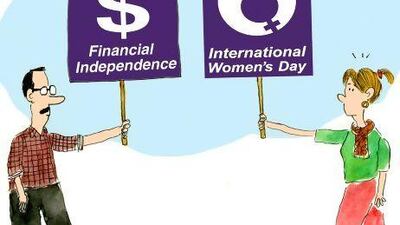"The largest growing segment of our population is poor, elderly women."
As International Women's Day was celebrated yesterday, I decided to look into how women are faring when it comes to their finances.
And I must say, the above finding, from a report by the Heinz Foundation, comes as no surprise.
Women tend to live longer than men - an average of three years. They are financially responsible for themselves for about a third of their adult life - in other words they have to earn and spend on themselves, so if you take their lower earning power into account, you can see potential money misery building up.
And because they live longer, they have often have more and bigger medical bills to pay. Add these points together and you can see how that growing segment of poor women in need comes about.
More facts: women still earn less than men.
Many, if not most, take years out of careers and work-life balance to raise families and/or look after elderly or ill family members. And there you have it: a growing army of females who are becoming more and more deprived.
Women's issues are not women's problems - they're everyone's problem.
Now let's talk about financial independence for a moment.
All too often I find people (women and men) equating financial independence with a woman having a job. Well, no, you should have this whether you are a high-flying executive, training to become a teacher's assistant, or staying at home to bring up your children.
Otherwise you're not doing yourself or your friends and family any favours.
After all, they're probably going to be the first port of call for help should there be a problem that needs money you don't have to fix it. (Think broken hip, water pipe in your home or major car repair).
What do I mean by financial independence? Well, I'm talking money basics - health insurance, pension policy, life insurance for your partner should you have dependents (so you get the money and can support your family should the worst happen), and an emergency fund that will get you through nine months at the very least.
All of this should be in place regardless of whether said woman works for a living.
But this is not just about being prepared for future contingencies. It is also about how many women feel about money, and what they do with it now, even in this age of gender equality.
All too often I come across women who believe that they are somehow inadequate when it comes to money matters, saying things along these lines:
I'm no good at handling money. Or: I'm going to marry a rich guy - he'll look after me.
And then there's a big segment who believe the men in their lives - partners, brothers, fathers - should be looking after their financial well-being, that they are simply not responsible for their own financial welfare.
A classic example of this thought process is a woman who, upon being asked what she was doing with her hard-earned cash and comparing it to what her brothers were doing, had a bit of an epiphany, saying that her brothers had bought land, a home and were building up investments, whereas she had none of the above.
Despite recognising the disparity, the epiphany was short-lived; she decided she was still going to go on her (latest) shopping spree to New York. This from someone who does not have money to burn and is working in the area of empowerment - albeit of young students.
And there we have that word again: empowerment. If you or the women in your life aren't financially empowered, everyone is affected, emotionally as well as financially.
So how about sitting down with the woman in your life - could be your wife, mother, daughter or friend - and sifting through their financial lives, helping them empower themselves, and you in the process? It'll be the best thing you do for her. Ever.
Nima Abu-Wardeh is the founder of personal finance website cashy.me

Empower the women in your life financially
On the money: As International Women's Day was celebrated yesterday, Nima Abu-Wardeh decided to look into how women are faring when it comes to their finances.
Most popular today
